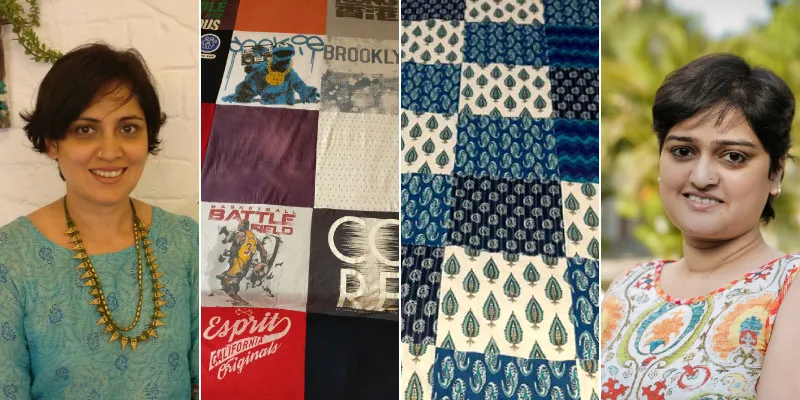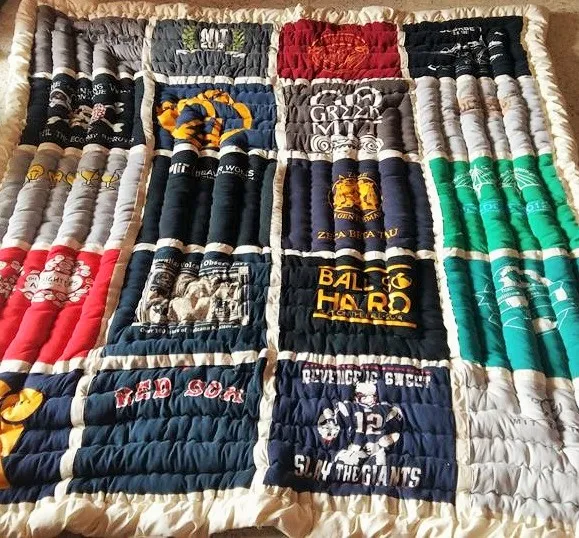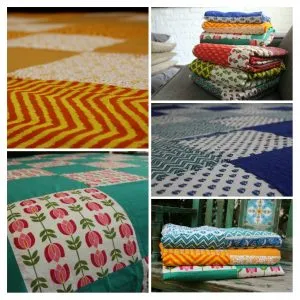Cornucopia recycles the memories that are too special to be thrown away
Those who have been holding on to old clothes either due to nostalgia or dislike for wastage can turn to this startup by two sister-founders to transform them into beautiful patchwork quilts and blankets.
Clothes might not maketh the man, but they do hold a lot of meaning. A gift from a loved one, the fun at a family wedding, the laughter of a little one at her birthday party - outfits evoke many memories and we find it difficult to discard them. Cornucopia, started by sisters Ayesha and Manisha Desai in January 2017, can be described as a do-good movement that recycles clothes to encourage a low-wastage lifestyle while also being a commercial venture. The Cornucopia team helps transform old and unused T-shirts, kurtas, bedsheets, dupattas or sarees into aesthetically pleasing patchwork quilts, baby blankets, and bed covers.
Recalling how they started off, Manisha says, “It all started with a trunk. For years, we had been saving all our 'never to be thrown' keepsake clothes in this old trunk back home. Year after year there would be additions until our mother put her foot down and ordered a spring cleaning. We still couldn't bear to part with them. Some reminded us of our wild carefree (and thin!) days while others evoked fond memories of friends. It was then it hit us that we can have our cake and eat it too! We cut up all those clothes and made a bright and colourful patchwork quilt! Eight years later, it's still going strong. And each time we use it, we get taken back to our happy place.”

What started with a single quilt snowballed into something the sisters didn’t quite expect. Friends and relatives started giving them their old clothes and they repurposed them all. Ayesha explains,
"What started off as spring cleaning has become somewhat of a mission for us."
Cornucopia’s mission is to get people to look at their possessions in a new light and rethink their consumption patterns. Through their products, the Cornucopia team encourages people to try and extend the life cycle of their clothes. Those clothes that they just don't want to part with, those clothes that just can't be donated – say, baby clothes or outfits that were received as gifts and have a high emotional value, can lead to reduced carbon footprint and moving away from a lifestyle of excessive consumerism.
The eco market
Upcycling and recycling with the intention of reducing waste and improving sustainability was almost unheard of in India a decade ago. Now there are many organisations working towards making a difference in this space. Upcycling boutique BlueMadeGreen reuses fabrics and materials and uses minimum new resources to make their products. Amishi Shah’s the Upcycle Project creates beautiful objects out of recycled pieces of glass, plastic, and other materials detrimental to the environment if not reused.
Kabadiwalla Connect works with designers to explore different ways in which waste can be upcycled with the intention of reducing the waste going into landfills. RootBazaar was founded through the desire for a zero-waste lifestyle. The founders Sabira Lakhani and Sahar Mansoor believe if we are going to mass consume, it should be done less impactfully. Their products are packaged in zero-waste packaging, using upcycled glass bottles with compostable coconut fibre twig for tags.
Sisters, best buddies, and partners in crime
“Poles apart,” is how the two co-founders describe their personalities. Ayesha, 38, and Manisha, 36, claim they have nothing in common despite the rhyming names! They have different interests and stay in different cities, but Ayesha and Manisha did find common grounds in their profession. They have both been into social work for over 15 years. While Ayesha's area of interest has been health and HIV; Manisha has been more inclined towards communication for development. Ayesha has worked with communities in Mumbai, Bengaluru, Gurgaon, New York, Los Angeles, and San Francisco on issues related to community health, substance abuse, and education. Manisha, on the other hand, has worked on issues related to trafficking, rural development, waste management as well as community outreach.

The fairy godmothers
They might not have a magic wand but the Cornucopia products do have a touch of fairy tale like whimsy about them. Ayesha says, “We work around design templates for each of our products. The clients can check out the templates and select the design of their choice. While most clients stick to the templates, there are some who request a custom design, which we take up too.” Each order has been a learning experience for the founders since the raw material is different and therefore the end product is never standard.
The dream team
The team works on 30-40 orders in a month, on an average, apart from direct sales of their readymade products like shopping bags, baby quilts, and bedcovers from new fabric (locally sourced natural fabric).
The sisters are based out of Gurgaon and Pune and have clothes pick up facility for Gurgaon, Delhi, Pune, and Mumbai. Apart from this, people can also send in their clothes from anywhere in the country.
Presently, they have a team of five artisans, who are paid well based on the principles of fair trade. They hire additional home-based workers according to the demand.
The marketing has been mostly word of mouth. Their Facebook page has also attracted a lot of interest. Currently bootstrapped, Ayesha and Manisha believe in organic growth and do not intend to stress out their team with rapid expansion plans.

A crazy rollercoaster
What has the experience of working with a sibling been like? Manisha exclaims,
"We never thought it would be so much fun! It's been pretty easy so far as it’s really simple to have your say (read: yell), have major disagreements (read: fights), and patch up again. That's what sisters do. Nothing needs to be sugar coated and no words are minced. The entire working relationship is based on unconditional trust and complete transparency – so it makes for the perfect work environment."







